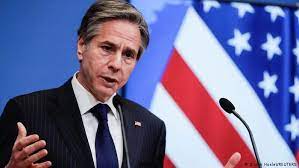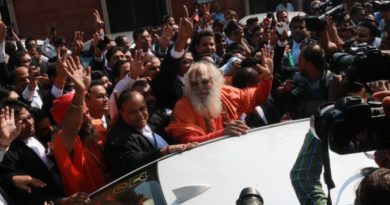Secretary Antony J. Blinken Releases 2020 International Religious Freedom Report

| US Secretary Antony J. Blinken released 2020 International Religious Freedom Report. On this occasion, Mr Blinken said “The United States remains committed to a two-state solution. This violence takes us further away from that goal. We fully support Israel’s legitimate right to defend itself. We’ve condemned and I condemn again the rocket attacks in the strongest possible terms. We believe Palestinians and Israelis equally deserve to live with safety and security and we’ll continue to engage with Israelis, Palestinians, and other regional partners to urge de-escalation and to bring calm”. Secretary Blinken mentioned that the report is produced in the form of a document every year for 23 years. It offers a comprehensive review of the state of religious freedom in nearly 200 countries and territories around the world, and it reflects the collective effort of literally hundreds of American diplomats around the world and our Office of International Religious Freedom here in Washington, led by Dan Nadel. He said that Religious freedom is a human right; in fact, it goes to the heart of what it means to be human – to think freely, to follow our conscience, to change our beliefs if our hearts and minds lead us to do so, to express those beliefs in public and in private. This freedom is enshrined in the Universal Declaration of Human Rights. It’s also part of the First Amendment to the U.S. Constitution. Our country’s commitment to defending freedom of religion and belief goes back centuries. It continues today. Religious freedom, like every human right, is universal. All people, everywhere, are entitled to it no matter where they live, what they believe, or what they don’t believe. Religious freedom is co-equal with other human rights because human rights are indivisible. Religious freedom is not more or less important than the freedom to speak and assemble, to participate in the political life of one’s country, to live free from torture or slavery, or any other human right. Indeed, they’re all interdependent. Religious freedom can’t be fully realized unless other human rights are respected, and when governments violate their people’s right to believe and worship freely, it jeopardizes all the others. And religious freedom is a key element of an open and stable society. Without it, people aren’t able to make their fullest contribution to their country’s success. And whenever human rights are denied, it ignites tension, it breeds division. As this year’s International Religious Freedom Report indicates, for many people around the world this right is still out of reach. In fact, according to the Pew Research Center, 56 countries, encompassing a significant majority of the world’s people, have high or severe restrictions on religious freedom. A few examples from this year’s report, Iran continues to intimidate, harass, and arrest members of minority faith groups, including Baha’i, Christians, Jews, Zoroastrians, Sunni and Sufi Muslims. In Burma, the military coup leaders are among those responsible for ethnic cleansing and other atrocities against Rohingya, most of whom are Muslim, and other religious and ethnic minorities around the world. In Russia, authorities continue to harass, detain, and seize the property of Jehovah’s Witnesses as well as members of Muslim minority groups on the pretense of alleged extremism. In Nigeria, courts continue to convict people of blasphemy, sentencing them to long-term imprisonment or even death. Yet the government has still not brought anyone to justice for the military’s massacre of hundreds of Shia Muslims in 2015. Saudi Arabia remains the only country in the world without a Christian church, though there are more than a million Christians living in Saudi Arabia. And authorities continue to jail human rights activists like Raif Badawi, who was sentenced in 2014 to a decade in prison and a thousand lashes for speaking about his beliefs. And China broadly criminalizes religious expression and continues to commit crimes against humanity and genocide against Muslim Uyghurs and members of other religious and ethnic minority groups. Today, I’m announcing the designation of Yu Hui, former office director of the so-called Central Leading Group Preventing and Dealing with Heretical Religions, of Chengdu, for his involvement in gross violations of human rights, namely, the arbitrary detention of Falun Gong practitioners. Yu-Hui and his family are now ineligible for entry into the United States. Secretary Blinken further said that more broadly, the US is seeing anti-Semitism on the rise worldwide, including here in the United States as well as across Europe. It’s a dangerous ideology that history has shown is often linked with violence. We must vigorously oppose it wherever it occurs. Anti-Muslim hatred is still widespread in many countries, and this, too, is a serious problem for the United States as well as in Europe. We have work to do to ensure that people of all faiths and backgrounds are treated with equal dignity and respect. As this report notes, some countries have taken positive steps forward, and that, too, deserves comment. Last year, the civilian-led transitional government in Sudan repealed apostasy laws and public order laws that had been used to harass members of religious minority groups. Uzbekistan’s government has released hundreds of people who have been imprisoned because of their beliefs. Just this past Saturday, Turkmenistan released 16 Jehovah’s Witnesses who are conscientious objectors and refused to serve in the military. The US understand the authorities will now offer conscientious objectors alternative ways to meet national service requirements and want to see more progress like that, and so our promise to the world is that the Biden-Harris administration will protect and defend religious freedom around the world. The US will maintain America’s longstanding leadership on this issue and is grateful to the partners, including like-minded governments, the UN Human Rights Council, and networks like the International Religious Freedom of Belief Alliance and the International Contact Group of Freedom of Religion or Belief. He said the US will continue to work closely with civil society organizations, including human rights advocates and religious communities, to combat all forms of religiously motivated hatred and discrimination around the world. |



